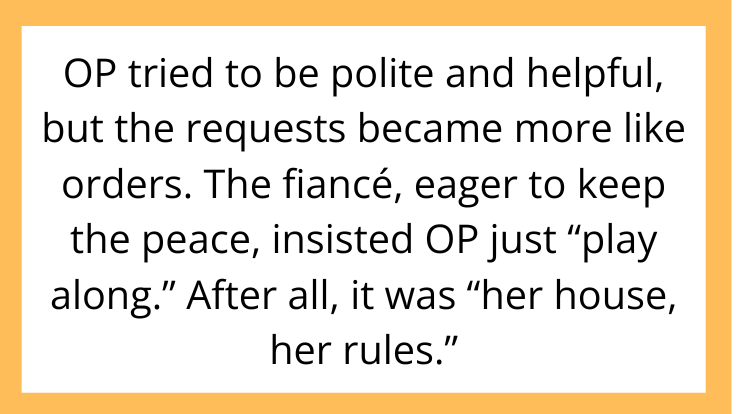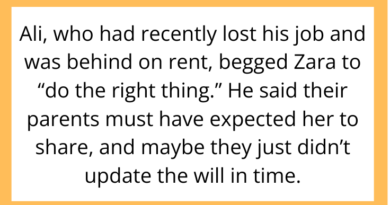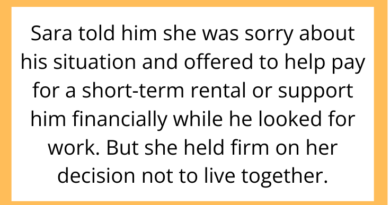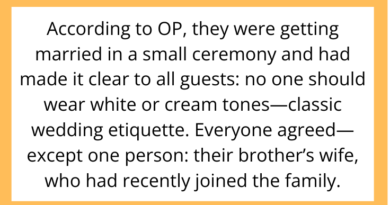AITAH for Telling My Fiancé’s Mom to Stop Treating Me Like Her Maid?
When you marry someone, you often inherit their family—quirks, traditions, and, sometimes, boundaries that get stomped on. A Reddit user recently shared their story in the r/AITAH community about clashing with their future mother-in-law, who seemed determined to treat them like unpaid help. The question: Were they out of line for finally speaking up?
The Situation: From Guest to Servant in One Visit

According to the original poster (OP), their fiancé’s mom never liked them much. During visits to her home, she’d make snide remarks about OP’s job, cooking, and even their clothes. But things escalated when she started giving OP “chores” every time they came over—demanding they clean the kitchen, set the table, and vacuum before dinner.
OP tried to be polite and helpful, but the requests became more like orders. The fiancé, eager to keep the peace, insisted OP just “play along.” After all, it was “her house, her rules.”
The Breaking Point: Enough Is Enough

During their latest visit, OP was instructed to clean up after a family barbecue while everyone else relaxed in the living room. Tired and humiliated, OP finally snapped:
“I’m not your maid. I’m a guest in this house, and I’m done being treated like the hired help.”
The room fell silent. The fiancé’s mom looked shocked, then furious. She accused OP of being disrespectful and ungrateful. OP and their fiancé left early, and the tension has been simmering ever since.
Family Fallout: Sides Are Taken
Afterward, the fiancé’s mom called to demand an apology. She claimed OP “embarrassed her in front of her family.” OP refused, arguing she had been treated poorly for years.
Some relatives sided with OP, saying the mother-in-law’s behavior was controlling and demeaning. Others felt OP should have kept quiet out of respect. The fiancé is stuck in the middle, torn between loyalty to his mother and his partner.
Why This Story Hit a Nerve
This post struck a chord because so many people have faced similar dilemmas:
-
When does helping become exploitation?
-
Does “respecting elders” mean tolerating disrespect?
-
Where is the line between keeping the peace and losing your self-respect?
Setting Boundaries Without Starting a War

Many commenters offered advice on navigating situations where in-laws overstep:
1. Speak Calmly, But Firmly
When you set a boundary, tone matters. You can be polite and still clear:
“I’m happy to help sometimes, but I also want to feel like a guest, not staff.”
This helps avoid escalating things into a shouting match.
2. Back Each Other Up
One reason this situation became so tense was OP’s fiancé failing to intervene. A united front is crucial. When your partner leaves you alone to deal with their family, resentment builds fast.
3. Clarify Expectations Before Visiting
Before the next get-together, OP and their fiancé should agree on what is and isn’t acceptable. That way, they’re prepared if the same pattern repeats.
Are You Obligated to Play Along?

A common theme in the discussion was the idea of “just go along to get along.” But many pointed out that constant disrespect should never be tolerated, no matter whose house you’re in.
As one Redditor put it:
“Respect goes both ways. If she wants you to act like family, she should treat you like family.”
Cultural Expectations vs. Personal Boundaries
Some commenters brought up cultural differences—how in certain families, younger members are expected to pitch in without question. But even then, there’s a big difference between helping as a guest and being singled out as the default servant.
It’s not about refusing to help—it’s about refusing to be demeaned.
The Verdict: AITAH?

The overwhelming consensus in the r/AITAH community: OP is not the jerk.
Setting a boundary is not an act of disrespect. It’s an act of self-respect.
How to Protect Your Peace Going Forward
If you’re dealing with in-laws or family members who treat you poorly, consider these steps:
Reflect on Patterns
-
Is this a one-time issue, or does it happen every visit?
-
Are you the only one being asked to help?
Communicate Early
Don’t wait until you’re exhausted and angry. Have a conversation when you’re calm and clear-minded.
Enlist Your Partner’s Support
Your fiancé should be your ally. Discuss how you’ll handle pushback together.
Be Ready for Consequences
Standing up for yourself may cause friction. But enabling disrespect only guarantees it will continue.
Conclusion: It’s Okay to Say No

At the end of the day, it’s perfectly reasonable to expect respect—especially from the people you’re about to call family. Being polite doesn’t mean being a doormat.
If you’ve ever felt trapped between wanting to help and needing to stand up for yourself, know you’re not alone. Boundaries are essential, no matter how uncomfortable they make others.



